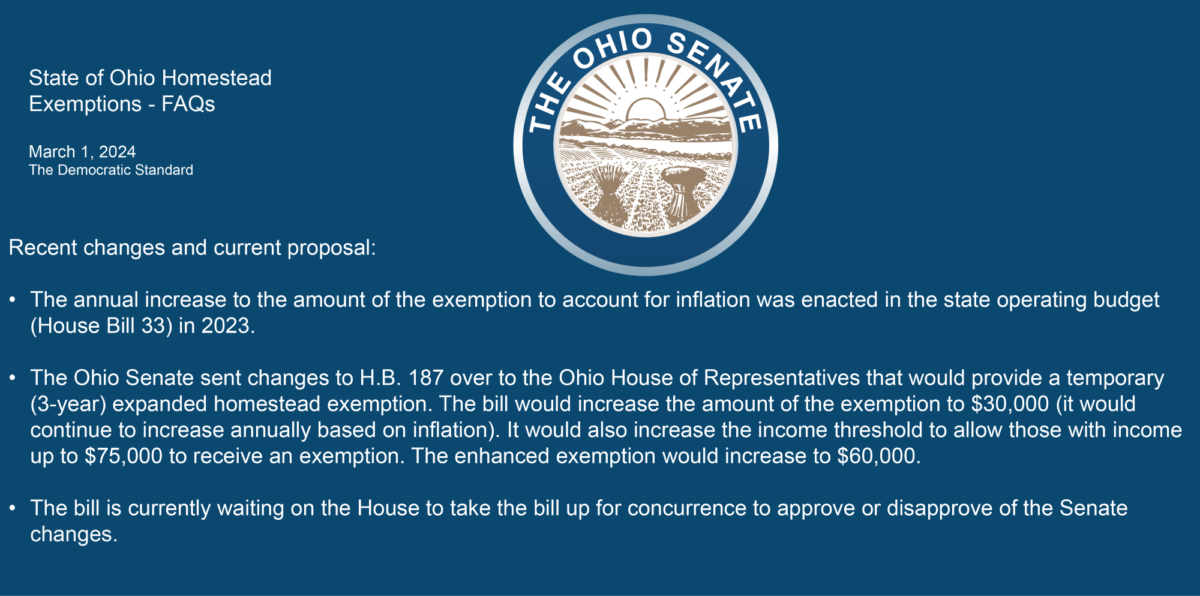By Ron Calhoun
Ohio House Bill 187 has significant revisions to the Ohio Homestead Exemption Program, which has long provided property tax relief to qualifying seniors and disabled veterans. The bill aims to expand access to the program and modify how property assessments are conducted, with potential implications for homeowners across the state, particularly in Cuyahoga County.
Advocates and local lawmakers say the inaction is possibly due to infighting between Republican lawmakers at the top: House Speaker Jason Stephens (R-District 93) and Senate President Matt Huffman (R-Lima).
Background: Ohio Homestead Exemption Program
The Ohio Homestead Exemption Program was originally designed to reduce the property tax burden for eligible seniors and disabled veterans by exempting a portion of their home’s value from taxation. Also, to qualify for the exemption, a homeowner’s income cannot exceed $36,100 for tax year 2023.
Key Expansion Introduced by House Bill 187:
- Increased Income Eligibility for Homestead Exemption
- Original Program: The income threshold for the homestead exemption was capped at $36,100, limiting access to property tax relief for many seniors and disabled veterans.
- Revised by HB 187: The bill raises the income limit to $75,000, allowing more seniors and disabled veterans to qualify for property tax relief under the program.
- Changes to Property Tax Assessment Ratio Studies
- Expanded Data: Under the revised bill, the tax commissioner must now consider all open-market, arms-length sales from the previous three years when conducting property tax sales assessment ratio studies, as opposed to relying on a smaller representative sample.
- Equal Weighting: Data from each of the three years will be given equal weight during the assessment process.
- Impact on Valuations: The changes are expected to moderate property value increases, resulting in lower property tax assessments for homeowners.
Potential Impact of the Revised Homestead Exemption for Cuyahoga County residents:
- Direct Benefit: Expanded income eligibility would significantly benefit seniors and disabled veterans in particularly in African American communities where many residents may now qualify for property tax relief.
- Reduced Tax Burden: Lower property taxes would increase disposable income for these households, improving financial stability.
- Equity Considerations: Despite the expanded eligibility, not all seniors or disabled veterans in these communities may qualify, which could create disparities.
Potential Impact of Changes to Assessment Ratio Studies:
- Moderated Property Value Increases: By averaging property values over three years, the bill aims to prevent sudden spikes in property assessments, which could be beneficial for homeowners in African American communities.
- Long-term Effects: The impact on property values and tax revenues for local governments remains uncertain, and further analysis is needed.
Overall Impact:
House Bill 187 represents a significant revision to the Ohio Homestead Exemption Program, potentially providing substantial property tax relief for many Ohio residents, particularly in densely populated areas like Cuyahoga County. However, the overall impact will depend on the specific implementation of the bill, the economic conditions in the county, and the distribution of income levels within affected communities.
As the bill progresses, residents need to stay informed and consider how these changes might affect their financial situation.




